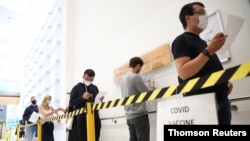The British government's scientific advisers have raised the prospect of fighting a forever war against the coronavirus saying the eradication of the virus "will be unlikely." And they warn "there will always be variants."
They hold out the hope that the virus may evolve in such a way that it causes "much less severe disease," but they caution that is unlikely to happen for some time. Preventive measures and restrictions will be needed in the meantime as there's a "realistic possibility" that vaccine-resistant variants will emerge.
And, chillingly, in a report released last week by Britain's Scientific Advisory Group for Emergencies, otherwise known as SAGE, the scientists do not discount the chance of a new variant arising with the deadliness of MERS, another coronavirus which has a case fatality rate of 35%.
Report quietly released
The report on the possible long-term evolution of the virus was released late Friday, and opposition politicians in Britain have complained it was sneaked out without little fanfare by the government to try to avoid publicity so as not to undermine public confidence in the easing of British pandemic restrictions and the opening of the country's borders to travelers from the United States and European Union.
"This report should have sent shock waves through the UK Government," Philippa Whitford, a Scottish Nationalist lawmaker and the vice-chair of an all-party parliamentary group on the pandemic, told local reporters."
It was instead quietly snuck out among a glut of reports during parliamentary recess. Recommendations and comments made by SAGE bring home the simple reality — that we have not yet 'defeated' this virus," Whitford, a qualified surgeon, added.
In the paper, the scientists outline the chances that a new variant will evade current vaccines, saying that is "almost certain" to happen. SAGE's biggest fear is of "antigenic drift," small changes in the genes of a virus that can lead to changes in its surface proteins. Most of the vaccines in current use target the surface proteins of the coronavirus. The scientists also worry about the possibility of variants recombining to become more infectious.
Clinical epidemiologist Deepti Gurdasani says the SAGE report "makes clear that the virus becoming less virulent is unlikely in the short term." She tweeted: "So for all those who suggest that we should live with it, and it'll become like seasonal coronaviruses and benign, doesn't look like that's likely to happen anytime soon."
The report has caught the attention of governments in Europe, and officials in Berlin say it played into the decision announced Monday by the German government to offer vaccine booster jabs to people considered potentially vulnerable to developing COVID-19, the disease the coronavirus can trigger.
Third shots
Starting next month, Germany will start administering a booster of the Pfizer-BioNTech or Moderna vaccine to people aged over 60, care-home residents and people with compromised immune systems. Also, a booster shot will be offered to Germans who received AstraZeneca or Johnson & Johnson vaccines, whose efficacy against the Delta variant is thought to be weak.
"We will be prepared for the fall," said Klaus Holetschek, Bavarian health minister. "I am convinced that a booster shot is important and right based on prevention alone," he added, speaking on behalf of the country's 18 state health ministers.
Israel, France and Hungary are already offering booster shots to some people, and Britain will offer booster jabs next month, too. British health officials say they want to maximize protection for the elderly and vulnerable ahead of the country's winter season, when other seasonal respiratory viruses surge. Italy and Spain will also likely make additional jabs available later in the year, officials in Rome and Madrid have said.
In the United States, officials are considering a request by vaccine-maker Pfizer for booster shots to be authorized, but so far has withheld permission. But the Biden administration has ordered 200 million more Pfizer vaccines, a move seen by observers as preparation for a regimen of booster shots.
Speaking to broadcaster CNCB, Scott Gottlieb, a former head of the US Federal Drug Administration, said he believes vaccine booster shots will start to be given in the US by next month to older people and those with compromised immune systems. "I just think we're on a slower path here," he said.
But some are criticizing the move by rich nations to start offering booster shots, saying the priority should be getting vaccines to poorer countries, who are lagging with inoculations because of scarce supplies. They say not only is this a moral issue but a practical one: vaccine-resistant variants are more likely to emerge as a result of widespread infections in poorer and developing nations, they say.
"Vaccine resources need to be shared with the world to help end this COVID-19 pandemic," the NGO Doctors Without Borders, tweeted Monday.







